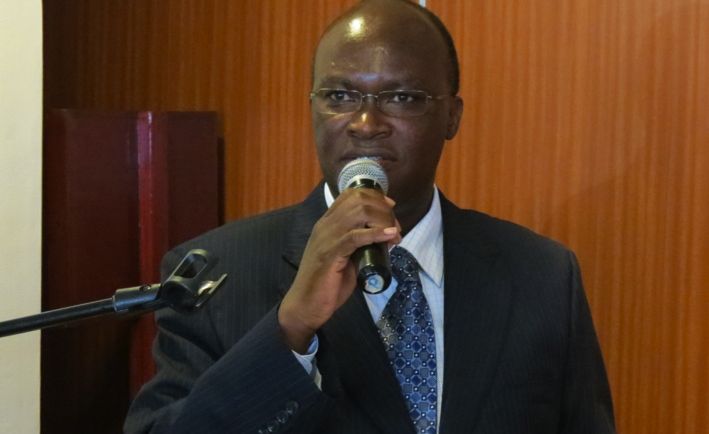The Health Policy Project ended in 2016. Work continued under Health Policy Plus (HP+) until 2022.
NEWS & VIEWS
 |
Mr. James Macharia, Cabinet Secretary for Health, opened the health induction course in Nairobi. Photo by Health Policy Project.
|
In late May 2013, the Kenyan Ministry of Health (MOH), with financial and technical support from the Health Policy Project (HPP), sponsored a five-day course to help the country's 47 county-level health directors understand their mandate within Kenya's newly devolved national health framework.
Among the objectives of this induction course were discussing the role that county health directors will play in a devolved system, introducing the participants to legislation and policies governing the devolution framework, and briefing participants on outstanding issues in the health sector currently being discussed by national and county government. Participants included MOH staffers appointed to assist counties during the transition process.
At the opening of the course, James Macharia, Cabinet Secretary for Health, spoke to participants about the need for a smooth transition to ensure that health services are not disrupted. “The induction that you are going to receive in the course of this week will equip you with knowledge on how to navigate the health agenda at the county level and ensure that Vision 2030 is realized,” he said.
Read Secretary Macharia's full remarks here (PDF).
The course agenda covered considerable ground, from an introduction of the devolution framework and an overview of devolution health services, to processes for planning and public finance management, procurement, function assignment, and much more.
Kenya's new Constitution, enacted in 2010, calls for a new system of devolved governance that creates two tiers of elected government at the county and national levels. Devolution will transfer many responsibilities for health planning, programming, policy, and budgeting from the national to the county and community levels, with the goal of reducing inequalities in health access and service provision. HPP works with the Kenyan government and other partners to strengthen health systems during the transition and to improve capacity to use evidence to craft new health policies and financing mechanisms.
The forum provided a valuable opportunity to share experiences and to restate the importance of moving together as a team to ensure that Kenyans receive the highest standards of health care. At the end of the course, participants appointed a council of 11 county health directors to engage the national government and county governors on the best way to harmonize devolution in the health sector to ensure that systems and structures are consistent from county to county.
In his closing remarks, Dr. Shahnaz Sharif, Director of Public Health and Sanitation at the MOH, asked HPP to support the new council and roll-out of the induction training program to the county health teams. HPP Program Director Stephen Muchiri informed the meeting that capacity building for county teams is included in Phase Two of HPP's support to the health sector and said he looks forward to fruitful engagement during future induction training.
What's New
- Something to Build On: “Innovation Exchange” Celebrates the Health Policy Project’s Close and a New Beginning
- What Will it Take for Tanzania to Achieve ART Targets and Ensure Long-Term Sustainability of the HIV Response?
- Helping Kenya’s County Leaders Advocate for Increased Health Investments
- HPP Holds Working Meeting on Ensuring Responsible PEPFAR Transitions for Key Populations
- Health Policy Project Celebrates 2016 International Women's Day
- HPP Staff Participate in White House Conference on HIV Stigma Reduction

